Good morning everyone:
We’re writing this morning from Boston, where Mrs. SSJ and I plan to attend her nephew’s wedding Monday. Unfortunately, the Red Sox aren’t in town so there will be no magical trips to Fenway this weekend. So, please hold off on the news until we return Tuesday morning when we’re ready to swing back into action as lawmakers return to work later this week. Now, on to the significant stories we published last week and other news you may have missed but need to know…
- U.S. Rep. Jake LaTurner abruptly announced last week that he would not seek reelection in the 2nd Congressional District this fall.
- Who might run to replace LaTurner? The list of possibilities is long.
- State fiscal analysts presented a stable-to-positive outlook for the state as Gov. Laura Kelly starts to pore over the numbers that will help guide her in deciding whether to veto a $1.55 billion tax bill on her desk. Republican leaders believe the new revenue forecast shows that the state can afford a tax cut.
- Will Gov. Laura Kelly part ways with Democrats in the Legislature and veto the tax bill?
- Kansas Attorney General Kris Kobach is questioning the constitutionality of a state law that gives cities the power to control development just outside their boundaries.
- A federal judge has ordered the Kansas Highway Patrol to pay $2.3 million in legal fees to the plaintiffs who successfully challenged as unconstitutional a technique used by troopers to detect drugs on motorists.
- Former Southeast of Saline School Board member Lori Blake announced last week that she plans to challenge Republican state Rep. Clarke Sanders for the House seat.
- Gov. Laura Kelly signed a bill that Evergy says will help it attract investor capital needed to meet the demands of new economic development.
- The April 12 date set for awarding the new Medicaid contracts has come and gone without any announcement of who will get to provide health coverage and services for roughly a half-million Kansans.
- Gov. Laura Kelly vetoed a bill toughening the penalties for injuring or killing a police dog, saying that the mandatory sentences are out of line with other, more severe crimes without any justification. House Speaker Dan Hawkins, who has been at odds with Kelly over expanding Medicaid throughout the session, called the veto “truly appalling” and attributed it to “political pettiness.”
- A legislative attempt to fix an election law facing a legal challenge was derailed when it was vetoed by the governor because it was packaged with a bill that bars government agencies from accepting or spending so-called “Biden bucks” related to elections.
- Gov. Laura Kelly last week vetoed a bill extending $10 million in tax credits for donations to pregnancy crisis centers, saying she thought it was wrong to send taxpayer dollars to these unregulated organizations.
- Gov. Laura Kelly announced the signing of a dozen bills, including one toughening the penalties for hit-and-run drivers and another that sets out a new way for foster children 16 and older to choose a caregiver.
- Gov. Laura Kelly signed a bill that triples the amount of money that goes toward keeping up public airports in Kansas.
- Gov. Laura Kelly signed a compromise plan that changes the calculus for school funding in a way that benefits growing school districts, but without suddenly hurting districts with declining student populations.
Election buffer zones
and private property
A state law that prohibits electioneering within 250 feet of a polling place can apply to private property, a new attorney general’s opinion says.
Attorney General Kris Kobach issued an opinion last month saying that county election officers could constitutionally prohibit electioneering on private property within 250 feet of a polling place on Election Day.
The opinion was in response to a request from the Atchison County attorney. A footnote says the opinion only addresses coverage of the buffer zone on Election Day.
The county attorney wanted to know whether the law violated the free speech clause of the First Amendment by prohibiting the display of a poster advocating the election of a candidate on private property within the buffer zone.
“We conclude that an election-day buffer zone that applies to both public and private
property is facially constitutional,” the opinion said.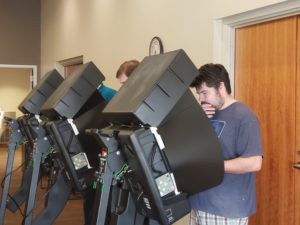
“We think that an election-day prohibition on electioneering is reasonable and does not significantly impinge on the constitutional rights of nearby private property owners who wish to display a campaign sign,” the opinion said.
The opinion points to a 1992 U.S. Supreme Court decision that found a Tennessee law with a 100-foot buffer zone was constitutional.
The Supreme Court found that the statute was narrowly drafted to serve a compelling state interest.
It ruled that by creating a buffer zone around polling sites, the law served the state’s interest in protecting its citizens’ right to vote freely and effectively.
The court also found that the 100-foot zone was acceptable since it was not so large as to completely block out the presence of political messages.
Four years ago, a federal judge, relying on that Tennessee case, upheld the constitutionality of a nearly 60-year-old Kansas law establishing a 250-foot buffer area to prevent electioneering at polling places.
U.S. District Judge Holly Teeter dismissed the lawsuit brought by the American Civil Liberties Union, which argued the law violated the constitutional right to free speech.
More recently, the U.S. 10th Circuit Court of Appeals considered a challenge to a Wyoming
law that prohibited electioneering within 300 feet of a polling place on Election Day and 100 feet of an absentee polling place for 45 days before the election.
The challenger also claimed the law was overbroad because it prohibited individuals from displaying campaign signs on nearby private property.
The appeals court upheld the 300-foot buffer zones and sent questions about the 100-foot zone back to district court for further review.
The appeals court also sent back to the district court claims that the law was overbroad because it applied to private property.
Based on the Supreme Court decision in the Tennessee case, the attorney general said he believes the Kansas law is constitutional.
And while some could argue the Tennessee case would not extend to political speech on
private property, the opinion said there are other instances where the Supreme Court has upheld government regulation of speech on private property.
The opinion points to a 1972 U.S. Supreme Court decision that upheld a Chicago ordinance
prohibiting individuals on public or private property adjacent to a school from making noise or diversions that disturbed the peace or good order of a school.
“Like electioneering on public property, electioneering on private property within the
buffer zone interferes with the act of voting itself,” the attorney general wrote.
“Voter intimidation or election fraud that originate from private property undermine a state’s sovereignty as much as voter intimidation and fraud originating from public property, so the state’s compelling interests remain the same,” the opinion said.
“Moreover, it is common for polling to occur on private property such as church buildings or other private facilities,” the opinion said.
“To hold that the First Amendment exempts private property from buffer zones would allow for electioneering at polls in these locations.
“When it comes to electioneering, then, we believe a court would find that the distinction between public and private property is immaterial,” the opinion said.
House 65 GOP primary
A Junction City contractor is mounting a Republican primary challenge against incumbent state Rep. Jeff Underhill.
Shawn Chauncey, 49, has filed to run against Underhill in House District 65.
Underhill, who also is a member of the Junction City Commission, is now finishing his first term in the Kansas House after replacing Lonnie Clark in the House.
A South Dakota native, Chauncey has lived in Kansas since 1997.
He’s run a contracting business in Kansas since moving here and for about the last five years, he’s focused on building homes.
“I would say I am a little bit more conservative than him,” Chauncey said of the incumbent. “I’m a little bit more for the people and less for the bigger government.
“I would prefer that people have a little bit more say in what the money is spent on,” Chauncey said in an interview Saturday.
Chauncey said education would be a priority, saying he’s concerned that students are graduating without practical skills that prepare them for the job market.
“As a contractor, I hire people and it’s very frustrating to me when someone comes in and can’t even read a tape measure or don’t know how to read a level or just don’t understand the basics,” he said.
“I think that’s what we’re lacking a little bit in our education system. I’d like to see that change,” he said.
“We put a lot of money into our education system. You see kids coming out that, first off, don’t know what a tape measure is and then don’t know how to use it,” he said.
Democratic Gov. Laura Kelly carried this district with about 52% the vote in the 2022 governor’s race, while Republican Derek Schmidt received about 44% of the vote.
About 37% of the voters in this district are Republicans and about 39% are unaffiliated. About 24% of the voters in this district are Democrats.
House 76 GOP primary
A special investigator for the Shawnee County district attorney has filed to run in the Republican primary against incumbent state Rep. Eric Smith of Burlington.
Brad Barrett has filed to run in House District 76, which includes all or parts of Coffey, Lyon and Osage County.
“With a career focused on protecting the innocent, I’ve dedicated my life to serving my community, driven by a deep-rooted passion for helping others,” Barrett posted on his campaign website.
“Guided by our Christian faith and family values, my wife, Sarah, and I believe in the importance of integrity, hard work, and conservative principles.
“I am committed to representing our district with honesty, transparency, and unwavering dedication,” he wrote.
Barrett has previously worked as a deputy sheriff in Coffey County and as a part-time deputy sheriff in Lyon County.
He received a law enforcement certification from the Johnson County Regional Police Academy and earned a bachelor’s in criminal justice from Pittsburg State.
Smith was elected to the Kansas House in 2016 when he defeated Democrat Teresa Briggs with about 64% of the vote.
He won a primary in 2020 when he defeated a Republican challenger with 69% of the vote.
The same candidate challenged Smith again in the 2022 Republican primary and Smith won that election with 64% of the vote.
Republican Derek Schmidt carried this district in the 2022 governor’s race when he received about 59% of the vote.
Democratic Gov. Laura Kelly received about 37% of the vote in this district.
About 56% of the voters in this district are Republican and about 26% are unaffiliated.
About 16% of the voters in the district are Democrats.
Davids continues to roll up dough
U.S. Rep. Sharice Davids piled up $733,506 during the last quarter, bringing her total for the current election cycle to about $3 million as she seeks a fourth term representing the 3rd Congressional District later this year.
The latest campaign finance reports filed for the first quarter ending at the end of March showed her with about $2.1 million in cash on hand.
By comparison, Davids had about $2.8 million in cash on hand at end of the first quarter in 2022 when she sought a third term and about $1.9 million in 2020 when she was seeking a second term on Capitol Hill.
Meanwhile, the leading Republican candidate challenging Davids has turned to his own coffers to help his campaign.
Johnson County oncologist Prasanth Reddy reported raising about $305,000 during the last quarter, including a $57,500 personal loan to his campaign. He has $561,718 in the bank.
Reddy reported raising $264,713 for the last quarter of 2023 and $313,003 for the third quarter of last year. He’s raised about $882,500 for the cycle.
Meanwhile, Johnson County businesswoman Karen Crnkovich has been struggling to raise money as Reddy has drawn a lot of support from national Republicans during the early stages of the primary.
Crnkovich, who owns a heating, cooling, ventilation and plumbing business, reported raising $10,655 during the first quarter. She had $51,615 in cash on hand.
She’s raised $120,481 for the cycle so far, well below Reddy and Davids.
Crnkovich reported raising about $19,600 in the fourth quarter last year, $32,733 in the third quarter and $57,461 in the second quarter.
Mystery poll
Sources in the 2nd Congressional District tell us they received a text over the weekend surveying them about Republican candidates who might run for the seat with U.S. Rep. Jake LaTurner not seeking reelection.
They relayed to us a screenshot of the text poll, which we obtained from a Democrat and a Republican source.
They were asked if they plan to vote in this year’s Republican primary, their opinion about Donald Trump, their opinion about U.S. Sen. Roger Marshall, their opinion about Attorney General Kris Kobach and their opinion about LaTurner.
They also were asked for their opinion on several candidates who are among those most often mentioned to run for the seat: former Attorney General Derek Schmidt, House Majority Leader Chris Croft, state Sen. Caryn Tyson and state Sen. Dennis Pyle.
Those who received the text poll were asked whether they viewed each of those possible candidates as favorable, unfavorable, unsure or never heard of.
Then they were asked if the election were today, if they would vote for Schmidt, Tyson, Croft or Pyle along with eight other possible candidates.
Those who were polled were asked if they also might would support LaTurner adviser Jeff Kahrs, Kansas Chamber President and CEO Alan Cobb, Kansas Bureau of Investigation Director Tony Mattivi, Leavenworth County Attorney Todd Thompson, outgoing Republican National Committeewoman Kim Borchers, state Rep. Pat Proctor, Shawnee County District Attorney Mike Kagay and Shawnee County Commissioner Aaron Mays.
We don’t know who was running the poll, although someone out there is very serious and it gives you a broader sense of who might be look at running, though at least in Mattivi’s case, he has already said he has no plans to run for the position.
Those who were polled were also asked about their views on abortion and whether it should be regulated by Congress or the states.
They also were asked to describe what kind of Republican they were: a Trump Republican, a traditional Reagan Republican, a Christian evangelical or a Libertarian Republican.
Lottery sets new sales record
For the second time in three years, the Kansas Lottery has set a new net sales record.
The Lottery reported about $338.2 million in net sales for fiscal year 2023, the most at any point since the Lottery started in 1988.
It broke the record of $326 million in net sales set in fiscal year 2021.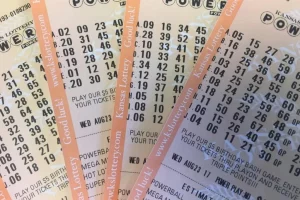
The Lottery also set a new record for transfers to the state with about $85.1 million, breaking the previous record of $80.1 million set a year earlier.
Lottery spokesperson Cory Thone attributed the new sales record partly to games such as Mega Millions and Powerball, which both had billion dollar jackpot runs.
The state’s share of the lottery proceeds — $85.1 million — are distributed for economic development, maintaining juvenile detention and adult correctional facilities, problem gaming, mental health programs and veterans programs, plus the general fund.
The first $50 million is divided by a formula that first transfers $80,000 to the problem gambling fund.
Then 85% of the balance is transferred to the economic development initiatives fund, 10% to the correctional institutions fund and 5% for the juvenile detention facilities fund.
Any receipts in excess of $50 million must be transferred to the state general fund.
Kelly vetoes ‘ballot harvesting’ bill
Gov. Laura Kelly last week vetoed a bill that would require county election officers to track the name of each individual who delivers an advance voting ballot on behalf of another voter.
The bill would have required county election officials to keep a record of the number of those ballots returned by each individual to the county election office.
If any individual returned more than 10 advance voting ballots during an election, the county election officer would be required to file a complaint with the secretary of state and the county or district attorney.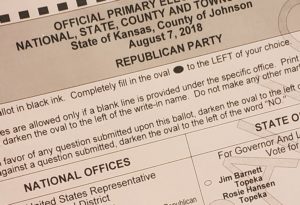
Three years ago, the Legislature passed a law that limited to 10 the number of ballots third parties can collect and deliver to election offices on behalf of someone else.
The law was challenged and is now pending before the Kansas Supreme Court.
“This bill is an attempt to disenfranchise Kansas voters by enacting burdensome and unnecessary requirements that are designed to restrict and suppress advanced voting,” Kelly said in a statement.
“Kansans have a right to participate in our democracy, but time and again some politicians have tried to interfere in the voting process,” she said.
“I will continue to oppose efforts that place obstacles between voters casting their ballots and making their voices heard.”
The bill passed 75-48 in the House and 26-13 in the Senate.
Republican state Rep. Pat Proctor, chair of the House elections committee, said the bill did nothing to make voting more restrictive.
“I am confounded by the governor’s explanation that she vetoed (the bill) because it makes voting harder,” he said.
The bill, he said, would have only required the names to now be printed on the ballot in addition to being signed. He said its a practice already followed by many county clerks.
“I am forced to ask, why does the governor with a million dollar PAC not want election officers to enforce the 10-ballot limit on ballot harvesting?”
The bill also would have removed the requirement for campaigns to include the name of the treasurer on political ads.
Under current law, the ads must include either the name of the campaign chair or the treasurer. The bill would only have required the name of the chair if there was one.
Croft gains early endorsement
With Congressman Jake LaTurner’s announcement that he’s not seeking reelection this year, there’s little time to get a campaign up and running in the 2nd District.
The primary election is now less than four months away, meaning there will be a compressed amount of time to put campaign infrastructure in place and start raising money.
House Majority Leader Christ Croft is among those thinking about running for the seat since he has a house in the district, although he now represents part of Overland Park.
Last week, Kansas Young Republicans came out in support of Croft, posting an endorsement on their X — formerly Twitter — account.
The Young Republicans not only urged Croft to run but promised their support because he’s been supportive of the group in the past,
“We believe Leader Croft is the strongest candidate that is ready to take the fight to Washington and champion the values we hold dear,” they posted.
“Should he decide to run, he can count on the full support of the Kansas Young Republicans, including our volunteer efforts to ensure a successful campaign.”
Democratic legislative director departs
Jaiden Soupene is leaving the Senate minority leader’s office to join a new and growing Democratic political consulting firm.
Soupene is stepping aside as the legislative director for the Democratic caucus to go to work as special projects manager for Tailwind, the firm set up by Kerry Gooch, former executive director of the Kansas Democratic Party.
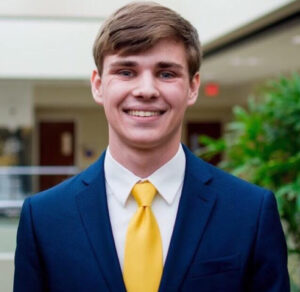
Soupene will leave his current job when the ongoing legislative session ends.
Soupene has served as a staffer for the Senate Democratic caucus since 2019, when he started as their agenda clerk before becoming the caucus director.
In 2021, he was promoted to legislative director, where he served as the Senate Democrats’ lead redistricting staffer in 2022.
In addition to legislative duties, he has led all fundraising efforts for the caucus.
House Minority Leader Dinah Sykes has not named a replacement.
Kobach joins legal action
against emission standards
Kansas Attorney General Kris Kobach has joined 12 other states in a lawsuit challenging new Biden administration pollution standards that critics say give electric vehicles an advantage over ethanol and other biofuels that could cut carbon emissions. Here’s coverage of the lawsuit from the Progressive Farmer, Ethanol Producer Magazine and KOLN-TV in Lincoln, Nebraska. Here’s more on that lawsuit from S&P Global.
Meanwhile, Kansas also joined with 24 other states last week to sue the U.S. Environmental Protection Agency to stop rules aimed at reducing carbon emissions from cars and light trucks and encourage electric vehicle manufacturing. Here’s the lawsuit filed last Thursday with the U.S. Court of Appeals for the District of Columbia. Opponents of the rule say it imposes “unworkable emissions standards on passenger cars, light-duty trucks and medium-duty vehicles.” They said the EPA is attempting to use the weight of the federal government to force manufacturers to produce more electric vehicles so that they would account for nearly 70% of car sales in less than a decade.
Kobach vs. Bank of America
Attorney General Kris Kobach last week sent a letter to Bank of America accusing the financial institution of “conditioning access to its services” on customers having its preferred religious or political views.
“Your discriminatory behavior is a serious threat to free speech and religious freedom, is potentially illegal, and is causing political and regulatory backlash,” Kobach wrote in a letter signed by 14 other state attorneys general.
“Your bank needs to be transparent with and assure us, its shareholders, and others that it will not continue to de-bank customers for their speech or religious exercise,” he wrote
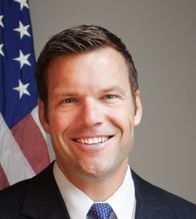
He said the bank has denied services to gun manufacturers, fossil-fuel producers, contractors for U.S. Immigration and Customs Enforcement private prisons.
He also accused Bank of America of canceling the accounts of multiple religious groups with “mainstream views” in the last three years, saying “it is no exaggeration to say that Bank of America is responsible for some of the worst-known instances of debanking.”
He said that in 2020, Bank of America sent a letter to Timothy Two Project International informing the Christian ministry that it was canceling its account because the group was “operating a business type we have chosen not to service.”
In April 2023, he said Bank of America canceled the accounts of Memphis-based Christian charity, Indigenous Advance, which collaborates with Ugandan ministries to provide basic necessities for orphaned and vulnerable children, support families.
A spokesperson for Bank of America denied the allegations in a report by Banking Dive, a specialty publication that covers financial institutions.
“Given the large number of non-profits we serve that are affiliated with religious organizations, it’s absurd to think religious beliefs are a factor in any account closing decision. Very simply, they are not,” the spokesperson told Banking Dive.
“Same applies re: conservatives,” the spokesperson wrote. “[P]olitical viewpoints are not a factor in any account closing decision.”
The attorneys general have asked for a report within 30 days that details account-cancellation policies and practices, particularly regarding “risk tolerance,” “reputational risk,” “hate,” “intolerance,” and similar terms
They also want to know whether Bank of America considers a customer’s speech or religious exercise — or public perception or other groups’ perception of them — as a component of those policies.
They also are demanding that the bank update its terms of service to state that it does not discriminate against customers for their religious or political views or speech;
Transgender treatment
The U.S. Supreme Court last week ruled that the state of Idaho could start enforcing a new state law that prohibits gender-affirming care for minors. The court’s ruling allowed the state to enforce the ban against everyone except the plaintiffs who brought the legal challenge to the law. Here’s coverage of the court’s decision from Reuters, NBC, Politico, Forbes, CBS, and The Associated Press.
Transgender sports
A federal appeals court last week ruled against West Virginia’s transgender sports ban, saying it violates the rights of a teen athlete under Title IX. A divided appeals court ruled that the law can’t be applied to a 13-year-old who’s been taking puberty blockers and identified as a girl since she was in the third grade. Here’s last week’s ruling from the 4th U.S. Circuit Court of Appeals. Here’s coverage of the ruling from The Associated Press, NBC News, Reuters, and Courthouse News Service.













